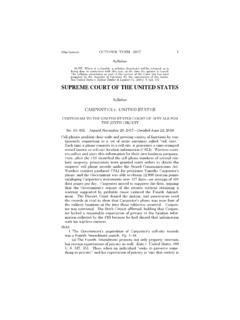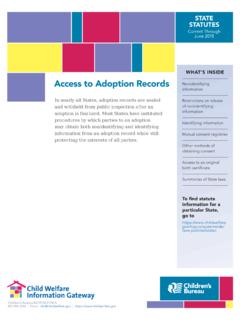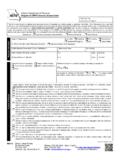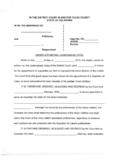Transcription of CONSTITUTIONAL COURT OF SOUTH AFRICA PFE …
1 CONSTITUTIONAL COURT OF SOUTH AFRICA Case CCT 129/11 [2012] ZACC 21 In the matter between: PFE international INC (BVI) first Applicant PFE international INC (LIBERIA) Second Applicant VAN DYCK CARPETS (PTY) LTD Third Applicant MEHDY ZARREBINI Fourth Applicant MEHRAN ZARREBINI Fifth Applicant and INDUSTRIAL DEVELOPMENT CORPORATION OF SOUTH AFRICA LIMITED Respondent Heard on : 14 August 2012 Decided on : 27 September 2012 JUDGMENT JAFTA J (Mogoeng CJ, Moseneke DCJ, Cameron J, Froneman J, Khampepe J, Skweyiya J and Van der Westhuizen J concurring): JAFTA J 2 Introduction [1] This is an application for leave to appeal against the judgment of the Supreme COURT of Appeal in which the High COURT order granted in favour of the applicants was overturned and the applicants were directed to pay the costs of the appeal. At the heart of the matter is the determination of the legislative regime regulating the exercise of the right of access to information held by the state after the commencement of legal proceedings.
2 The applicants contend that the Promotion of Access to Information Act1 (PAIA) is the relevant legislation, whereas the respondent claims that Rule 38 of the Uniform Rules of COURT (Uniform Rules) applies. The High COURT upheld the applicants contention2 but the Supreme COURT of Appeal reversed the order based on that finding and held that access to the requested information may be sought in terms of Rule CONSTITUTIONAL and legislative framework [2] For a better understanding of the applicants claim for access to information and the respondent s refusal, it is necessary at the outset to outline the legal basis for the claim. The right of access to information held by the state is guaranteed by section 32 of the Constitution. It provides: (1) Everyone has the right of access to (a) any information held by the state; and 1 2 of 2000. 2 PFE international Inc (BVI) and Others v Industrial Development Corporation of SOUTH AFRICA Ltd 2011 (4) SA 24 (KZD).
3 3 Industrial Development Corporation of SOUTH AFRICA Ltd v PFE international Inc (BVI) and Others 2012 (2) SA 269 (SCA) (IDC). JAFTA J 3 (b) any information that is held by another person and that is required for the exercise or protection of any rights. (2) National legislation must be enacted to give effect to this right, and may provide for reasonable measures to alleviate the administrative and financial burden on the state. [3] The importance of this right has been explained by this COURT in Br mmer v Minister for Social Development and In that case the COURT said: The importance of this right too, in a country which is founded on values of accountability, responsiveness and openness, cannot be gainsaid. To give effect to these founding values, the public must have access to information held by the State. Indeed one of the basic values and principles governing public administration is transparency.
4 And the Constitution demands that transparency must be fostered by providing the public with timely, accessible and accurate information .. Apart from this, access to information is fundamental to the realisation of the rights guaranteed in the Bill of Rights. For example, access to information is crucial to the right to freedom of expression which includes freedom of the press and other media and freedom to receive or impart information or ideas. 5 (Footnotes omitted.) [4] PAIA is the national legislation contemplated in section 32(2) of the Constitution. In accordance with the obligation imposed by this provision, PAIA was enacted to give effect to the right of access to information, regardless of whether that information is in the hands of a public body or a private person. Ordinarily, and according to the principle of CONSTITUTIONAL subsidiarity, claims for enforcing the right of access to information must be based on 4 [2009] ZACC 21; 2009 (6) SA 323 (CC); 2009 (11) BCLR 1075 (CC).
5 5 Id at paras 62-3. 6 Mazibuko and Others v City of Johannesburg and Others [2009] ZACC 28; 2010 (4) SA 1 (CC); 2010 (3) BCLR 239 (CC) at para 73. See also MEC for Education, KwaZulu-Natal, and Others v Pillay [2007] ZACC 21; 2008 (1) SA 474 (CC); 2008 (2) BCLR 99 (CC) at para 40; SOUTH African National Defence Union v Minister of Defence and Others [2007] ZACC 10; 2007 (5) SA 400 (CC); 2007 (8) BCLR 863 (CC) at para 52; JAFTA J 4 [5] Section 11 of PAIA gives effect to the right of access to information held by public bodies. It reads: (1) A requester must be given access to a record of a public body if (a) that requester complies with all the procedural requirements in this Act relating to a request for access to that record; and (b) access to that record is not refused in terms of any ground for refusal contemplated in Chapter 4 of this Part. (2) A request contemplated in subsection (1) includes a request for access to a record containing personal information about the requester.
6 (3) A requester s right of access contemplated in subsection (1) is, subject to this Act, not affected by (a) any reasons the requester gives for requesting access; or (b) the information officer s belief as to what the requester's reasons are for requesting access. [6] However, access to information held by bodies such as Cabinet and the courts cannot be sought in terms of PAIA because this Act does not apply to those bodies. Section 12 of PAIA provides: This Act does not apply to a record (a) of the Cabinet and its committees; (b) relating to the judicial functions of (i) a COURT referred to in section 166 of the Constitution; (ii) a Special Tribunal established in terms of section 2 of the Special Investigating Units and Special Tribunals Act, 1996 (Act 74 of 1996); or (iii) a judicial officer of such COURT or Special Tribunal; (c) of an individual member of Parliament or of a provincial legislature in that capacity; or and Bato Star Fishing (Pty) Ltd v Minister of Environmental Affairs and Others [2004] ZACC 15; 2004 (4) SA 490 (CC); 2004 (7) BCLR 687 (CC) at paras 22-6.
7 JAFTA J 5 (d) relating to a decision referred to in paragraph (gg) of the definition of administrative action in section 1 of the Promotion of Administrative Justice Act, 2000 (Act 3 of 2000), regarding the nomination, selection or appointment of a judicial officer or any other person by the Judicial Service Commission in terms of any law. [7] Apart from information in possession of public bodies listed in section 12, PAIA does not apply to information sought for the purposes of civil or criminal proceedings, if the request for access is made after the commencement of proceedings and access to that information is provided for in another law. This is the position irrespective of whether the information is held by a public or private Background and legal history [8] The following facts are common cause. The first and second applicants PFE international Inc (BVI) and PFE international Inc (Liberia) are companies in the PFE group of companies which carried on various businesses, including the manufacturing of carpets.
8 The fourth and fifth applicants , Messrs Mehdy Zarrebini and Mehran Zarrebini, are directors of the first and second applicants . The third applicant, Van Dyck Carpets (Pty) Ltd, is a member of the PFE group. [9] In September 2001, the first applicant purchased 45% of the shares in SOUTH African Fibre Yarn Rugs Limited (SAFYR) from the respondent, the Industrial Development Corporation of SOUTH AFRICA (IDC), which held 98% of the shares in the company. As a result of the acquisition, the fourth and fifth applicants became 7 See section 7(1) quoted in [19]. JAFTA J 6 directors of SAFYR while they continued as directors of the first applicant. The first applicant, through Messrs Zarrebini, acquired shares in Van Dyck Carpets. [10] Subsequently, SAFYR instituted proceedings in the High COURT , seeking an order directing the applicants to transfer those shares to it.
9 SAFYR asserted that Messrs Zarrebini, in their capacity as its directors, owed it a fiduciary duty. They acquired the shares in the applicant in breach of that duty. These proceedings were referred to trial and pleadings were filed. After the close of pleadings, SAFYR requested further particulars for trial. It sought information based on the allegations made in the plea filed by the applicants . [11] The applicants did not furnish the particulars but, acting in terms of PAIA, requested access to the records of the IDC. When they received no response, they launched the present application in the High COURT . The applicants invoked section 11 of PAIA to enforce their right of access to information held by the IDC, which is a public body. The purpose for which access to records was required appears in the founding affidavit. In relevant part it reads: [T]he information necessary to respond to some of the particulars requested [by SAFYR].
10 Is contained in the documents requested .. and the information in those documents and records is peculiarly within the knowledge of the Respondent in the sense that in order to respond to the Request for Further Particulars for Trial the applicants require access to the documents requested .. so as to be able to obtain the necessary information .. [T]he applicants also require access to the information and records to prepare for trial but: (i) as the Respondent is not a party to the application, it cannot be compelled to make discovery; JAFTA J 7 (ii) the identity of the particular books and records is within the peculiar knowledge of the Respondent and cannot be identified for the purpose of a subpoena duces tecum. [12] In opposing the relief sought, the IDC contended that since access to the relevant records was requested for the purposes of civil proceedings which were already pending in the High COURT , the applicants should have sought the relevant information by means of a subpoena duces tecum, issued in terms of Rule 38(1)(a) of the Uniform Rules.














